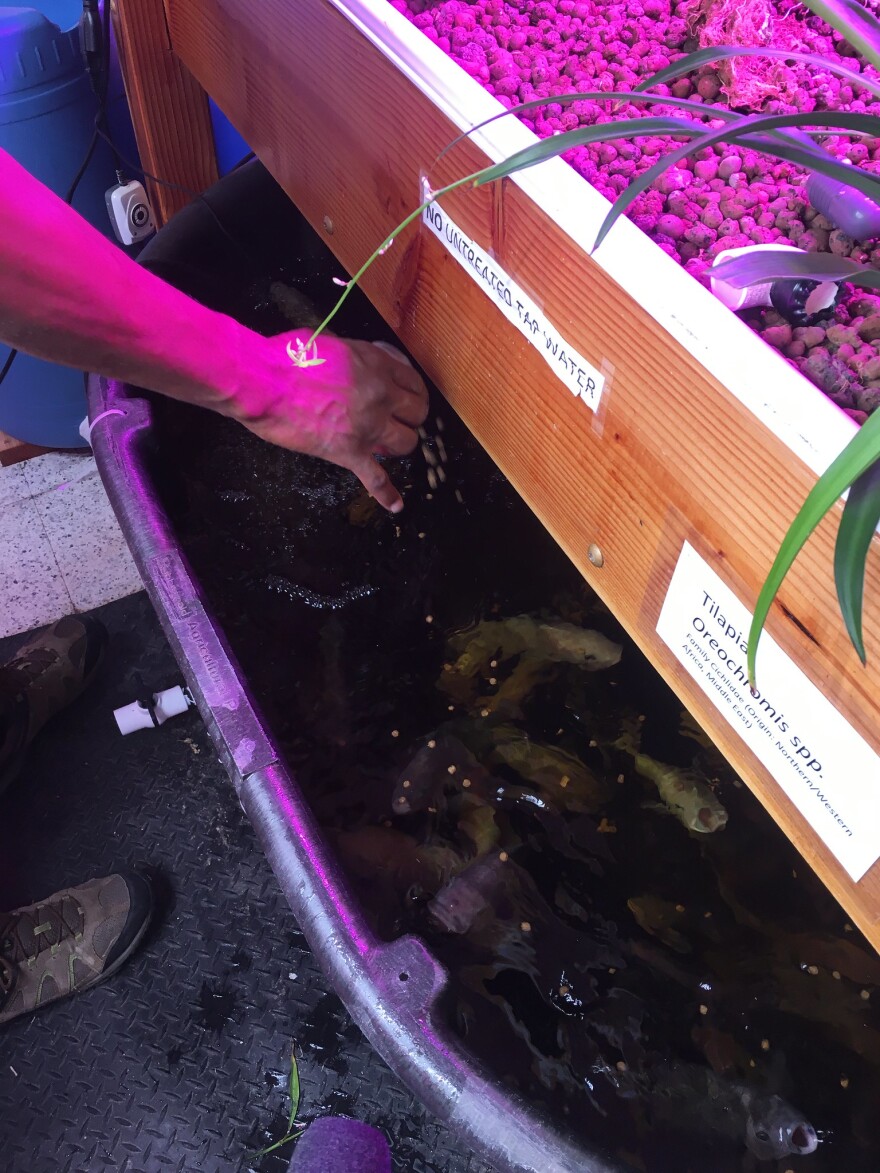Maine’s growing season is relatively short, but a group of young farmers has found a way to extend the season with the help of some unlikely farm-hands — fish.
Aquaponics takes place inside greenhouses, where beds of produce grow on top of fish tanks. In Maine, aquaponics pioneers believe the industry could provide sustainable, year-round jobs for a new generation of farmers.
At Springworks Farm in Lisbon, there are no mooing cows or bleating sheep. Visitors can hear only the bubbling sound of water moving between fish tanks and beds of lettuce. Trevor Kenkel started this aquaponics operation in 2014 during his first year at Bowdoin College.

“It’s a system in which the fish produce fertilizer for the plants, which allows them to grow and clean the water for the fish,” says Kenkel. “It’s essentially a symbiotic relationship. And for us, we’re really just stewards of an ecosystem.”
It’s an ecosystem that occurs naturally in lakes and ponds. The fish excrete ammonia, which bacteria then convert into nitrate for the plants. In return, the plants enrich the water with new oxygen for the fish to breathe.
Springworks Farm produces almost one million heads of lettuce and 20,000 pounds of tilapia every year. That’s because, unlike most conventional farms, it can operate year-round. In fact, these systems are the most cost effective after the fall harvest.

Theo Willis is an adjunct faculty member at the University of Southern Maine, where he teaches aquaculture and runs the school’s aquaponics system. He says “aquaponics is a losing proposition in summer” but the growing season never ends.
“There is no way, with an aquatic system, you can keep up with what someone can do under natural light in a farm field during the summer,” says Willis. “But starting in about November, the tables turn. We can grow pretty much whatever we want from November to May when nobody’s got anything in the field.”
Year-round farming, Willis says, means year-rounds jobs for growers, opening new possibilities for some high school students across the state who have already explored aquaponics systems in their classrooms.
“There’s really a space in the state for figuring out how to come up with robust lesson plans around the systems that move from the elementary level through secondary school up into college … If everything works out, then there are jobs for these kids to go to later too,” says Willis.

And those future jobs may be either on the farm side or, perhaps, closer to the table.
At Canopy Farms in Brunswick, the operators are using the produce grown in their aquaponics greenhouse to supply their adjacent restaurant, Tao Yuan. Kate Holcomb directs the farm, which will produce specialty Asian greens that can be hard to find in Maine. Eventually, she hopes to harvest striped bass or trout as well. She says that while traditional jobs in both agriculture and food tend to be seasonal, she believes operations like Canopy Farms can offer a full 40-hour week all year round.
“Food is so important in our state, I mean it's important to everybody, but in terms of both agriculture and our food industry, they provide a lot of jobs here. And what we really want to do is try and make sure they’re good jobs,” says Holcomb. “So somebody could really work here full time, maybe do a little bit at the farm and at the restaurant.”

Advocates of aquaponics say the systems are doubly sustainable: they provide year-round farming jobs and are environmentally friendly. Kenkel says that at Springworks they use “about 90 percent less water, depending on the time of year, than what conventional growers use in soil.” In addition, most aquaponics farms are local, reducing shipping pollution and the food waste that comes along with trucking perishable products across the country.
Canopy Farms and Springworks are still the only two commercial aquaponic farms in Maine, but the state Department of Inland Fisheries and Wildlife says these systems are becoming increasingly more popular. Springworks, meanwhile, is expanding its reach nationally, by selling 10-gallon “micro-farms” capable of growing herbs and lettuce to interested schools and families.
Eliana Miller is a 2019 Dowe Intern at Maine Public.







